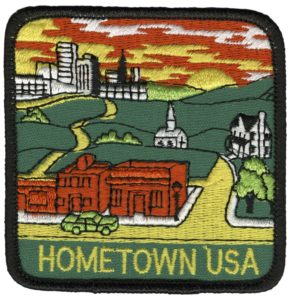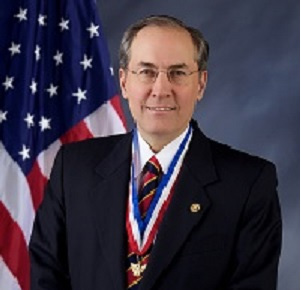Overview

A youth program between Keep America Beautiful Inc. and the BSA that recognizes outstanding efforts of Scouts in their communities in regard to citizenship and environmental improvement; provides way for Scouts to make significant contribution toward keeping America beautiful.
Who Can Earn This Award?
Earned by Scouts BSA members.
How To Get the Award
Sold by Supply.
Supply/BIN Item Number
Emblem, No. 356
Keep America Beautiful Hometown USA Award Requirements
Background
Keep America Beautiful was founded in 1953 with the purpose of building and sustaining a national cleanliness ethic. Scouting America has been affiliated with Keep America Beautiful for more than 50 years at the national level and through KAB’s national network of more than 600 community affiliates.
In 1971, Scouting Keep America Beautiful Day was first cosponsored by KAB and the BSA as a massive national cleanup and recycling program. Millions of Scouts still turn out annually to participate in community-enriching activities such as the Great American Cleanup and America Recycles Day.
Requirements
Merit badges. Earn three merit badges from the following list of 13 (*required for Eagle): Citizenship in the Community*, Communication*, Energy, Environmental Science*, Fish and Wildlife Management, Forestry, Gardening, Geocaching, Landscape Architecture, Photography, Public Speaking, Soil and Water Conservation, Sustainability*.
Community service project. In addition to earning the merit badges, a Scout is required to perform a community service project. The project should involve a minimum of eight hours of time, two of which must involve management planning, with the other six consisting of carrying out the project. It should help keep America beautiful and benefit the community either physically or financially. One way to do this is to plan the community service project as part of a Keep America Beautiful program. See some examples below.
Plan and execute a Great American Cleanup in your local community. Adopt a park, block, beach, or vacant lot. Remove litter and debris. Build picnic tables or fix up old ones. Paint benches.
Build a nature trail or trashless trail for use as an outdoor classroom or for community enjoyment.
Register and organize an America Recycles Day event that involves your unit (i.e., newspapers, electronic gadgets, and/or bottle collections).
Conduct a litter survey of local storefronts. Determine areas where litter exists, and work with store owners/local government to help improve conditions.
Become involved in a local environmental/recycling issue. Attend public meetings, talk to public officials, and make a report to your unit about what you have learned. Decide how you want to become involved in resolving the issue and spend your project time educating your fellow citizens as to your viewpoint and assisting your “side” in its campaign.
Develop and help maintain a community garden or tree trail in your community.
Plan and make a presentation to elementary students about the importance of conserving natural resources. Take students on a nature walk, pointing out natural resources.
Conduct soil and water conservation activities on a heavily used trail to prevent erosion. Record your activities.
Construct water facilities and plant vegetation that will provide food and shelter for wildlife in appropriate places.
Organize an anti-litter poster competition among junior and senior high school students. Arrange for businesses to donate awards for the winners and recruit community judges. Include media coverage. Get local businesses and schools to display the posters.
Getting the Patch
Scouts must complete the Hometown U.S.A. Award application form and present it to their unit leader or unit advancement chairperson.
In order to qualify for the award, Scouts must have successfully completed the requirements as outlined. The unit advancement chairperson will know which merit badges each Scout needs in order to qualify.
It is suggested that the community service project be under the overall direction of a natural resources professional or other qualified adult supervisor. After completing the project, the adult supervisor should sign a statement that the project has been completed and meets the requirements of the project sponsor.
Additional Resources for Hometown U.S.A. Award
The following is a list of organizations and the free brochures that may be obtained to assist Scouts in earning the required merit badges included in the Hometown U.S.A. Award.
Keep America Beautiful
Keep America Beautiful Inc. 1010 Washington Boulevard Stamford, Connecticut, 06901 Website: http://www.kab.org
U.S. Department of the Interior
The U.S. Department of the Interior (DOI) is the federal executive department of the U.S. government responsible for the management and conservation of most federal land and natural resources, and the administration of other programs.
Department of the Interior 1849 C Street, N.W. Washington DC 20240 Website: http://www.doi.gov
American Forest Foundation
The American Forest Foundation works on the ground with families, teachers, and elected officials to promote stewardship and protect our nation’s forest heritage.
American Forest Foundation 2000 M St. NW Washington, DC 20036 Website: https://www.forestfoundation.org/
National Wildlife Federation
The National Wildlife Federation is the United States’ largest private, nonprofit conservation education and advocacy organization, with more than 4 million members and supporters, and 48 state and territorial affiliated organizations.
National Wildlife Federation P.O. Box 1583 Merrifield VA 22116-1583 Website: http://www.nwf.org/
Arbor Day Foundation
The Arbor Day Foundation, which has a mission “to inspire people to plant, nurture, and celebrate trees,” was founded in 1972 by John Rosenow. The foundation is supported by donations, selling trees and merchandise, and by corporate sponsors.
Arbor Day Foundation 211 N. 12th St. Lincoln, NE 6850 Website: https://www.arborday.org/
Scouts may contact the following within their communities:
Consultants—naturalists, park rangers, refuge managers, biologists, foresters, 4-H extension agents, science teachers, librarians
Groups—parks and recreation departments, wildlife refuges, sanitation departments, recycling centers, nature or science centers, state fish hatcheries, soil and water conservation or natural resources district.




